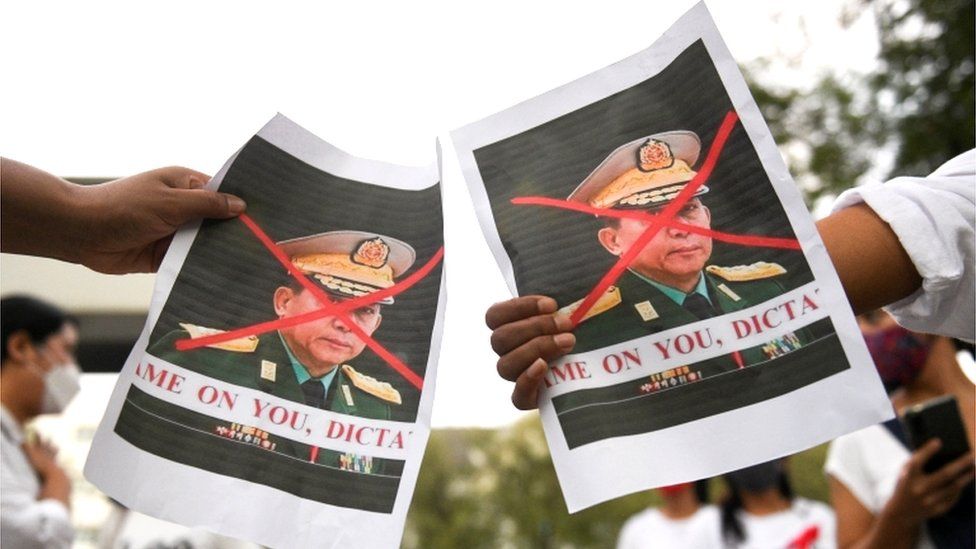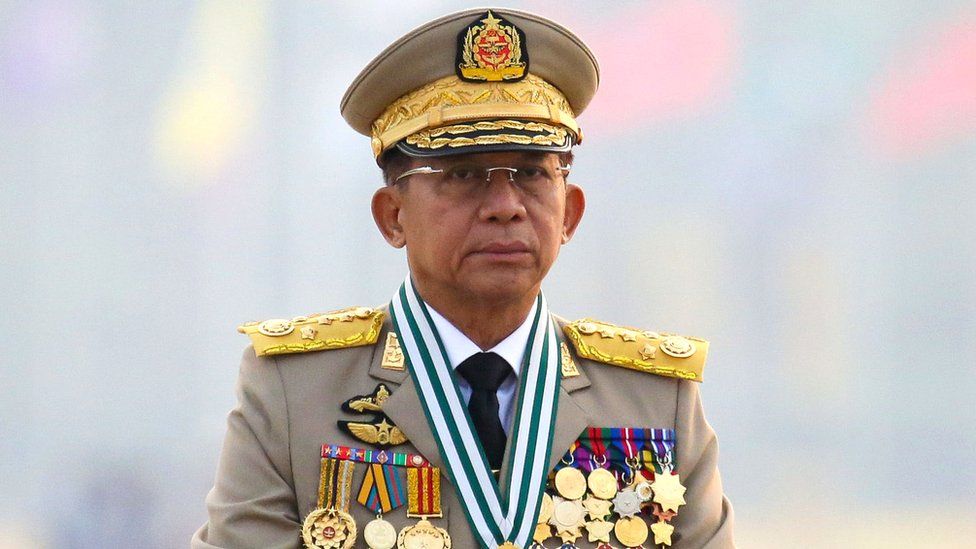South East Asian leaders have urged the head of the Myanmar army, which took power in a coup in February, to end the violent crackdown in the country.
In his first known foreign trip since the takeover, General Min Aung Hlaing heard calls for the military to stop killing protesters and to release political prisoners.
More than 700 people have been killed and thousands detained since the coup.
The talks in Indonesia were the first big effort to address the crisis.
A statement released after the summit said the leaders and foreign ministers from the 10-member Association of Southeast Asian Nations (Asean) had reached a consensus on five points.

They included asking for an immediate stop to the violence and opening a dialogue between the military and civilian leaders, with that process overseen by a special Asean envoy who would also visit with a delegation. The group also offered humanitarian assistance.
The consensus was welcomed by Myanmar’s newly formed National Unity Government (NUG), a group made up of opponents of the coup – including pro-democracy figures, representatives of the armed ethnic groups and former members of civilian leader Aung San Suu Kyi’s former government.
After the meeting, which was held in the Indonesian capital Jakarta, Singapore Prime Minister Lee Hsien Loong said the general was “not opposed” to a visit by as Asean delegation or humanitarian assistance, adding: “He said he heard us, he would take the points in which he considered helpful.”
Malaysian Prime Minister Muhyiddin Yassin also called for unconditional release of political prisoners. Aung San Suu Kyi remains in detention, as well as anti-coup leaders.
“The deplorable situation in Myanmar must stop immediately,” he said.
Demonstrators gathered near the venue of the summit, beating pots and pans and holding signs that read “Restore democracy” and “We stand against the military coup”. Protests were also held in Myanmar’s main cities but there were no immediate reports of violence.
‘Clear splits over taking action or not’
Despite the risk of massive refugee flows or even civil war, Asean members have been divided over whether to even hold a meeting. There are clear signs of splits between governments that want to take action and those that don’t.
Asean appears divided along geographical lines, with the “mainland” countries – those physically closest to China – more opposed to intervention in Myanmar, while the “maritime” countries – those furthest from China – are more in favour of taking action.
Among the latter group, it is host Indonesia that has been pushing hardest for a collective response to the crisis.
But persuading the other nine countries to take a unified stance will be just as much a challenge as persuading the Myanmar junta to de-escalate the crisis.

While the bloc prides itself on its ability to persuade rather than coerce, that ability is much weaker if the organisation is not united.
United Nation’s Secretary-General António Guterres had called for the Asean summit to resolve the crisis and prevent “possible grave humanitarian implications beyond Myanmar’s borders,” UN spokesman Stephane Dujarric said.
There have been calls for Myanmar, also known as Burma, to be expelled from Asean but the members historically do not get involved in each other’s internal affairs.
The UN special envoy for Myanmar, Christine Schraner Burgener, is in Jakarta for meetings on the sidelines of the summit.
Mass protests have been taking place across Myanmar since the military seized control and declared a year-long state of emergency.
The armed forces claim there had been widespread fraud during a general election late last year which had returned elected leader Aung San Suu Kyi and her National League for Democracy party (NLD) to power.
The military promised instead that it would hold “free and fair” elections once the state of emergency is over.

In the past few weeks, the military has been increasing its use of force against protesters. More than 80 people were killed in one incident in the city of Bago earlier this month.